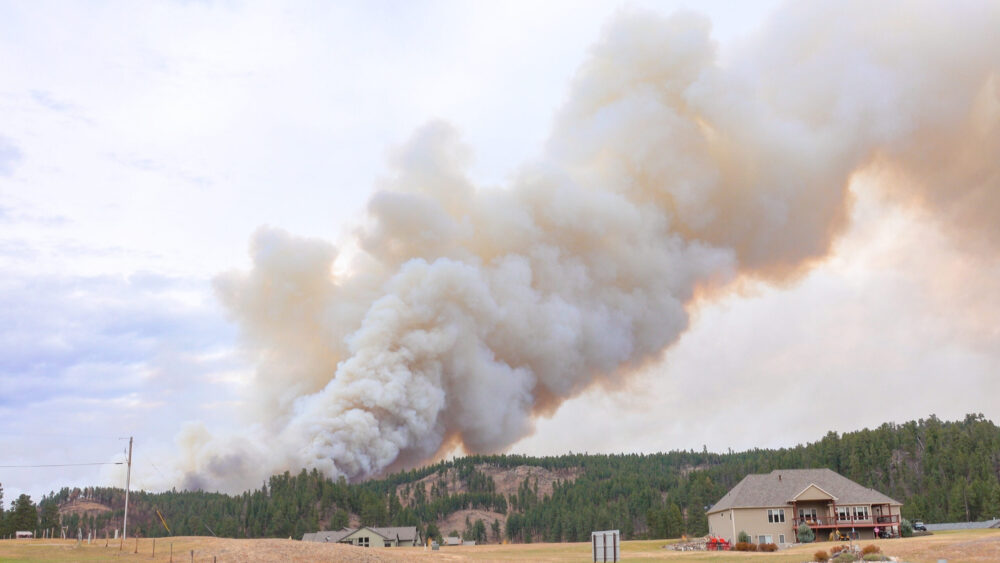Outside of their immediate impact on human lives, a natural disaster can carry a very significant economic impact, which is why it’s important to always have a proper response prepared–especially if you’re a professional contractor whose client’s home gets destroyed by said disaster.
Why Any Contractor Needs to Consider Their Response to a Natural Disaster
In places where integrators tend to work, these scenarios can be quite common, occurring somewhat regularly on an annual basis, which is why it makes sense for anyone working as a contractor there to have a professional response plan in the event of natural disaster.
Some examples of recent episodes include the 2025 Californian wildfires that started back in January and the landfall of Hurricane Ian back in 2022. And then there’s all the smaller incidents that can occur between these.
Even if a “less sever” disaster occurs in the middle of a project, that’s potentially hundreds of thousands of dollars in the form of services and products that are suddenly rendered worthless.
There’s also all the time investment put towards supporting your own business that is suddenly rendered worthless.
Couple that with the severely heightened emotions surrounding such a substantial loss on the client side and the situation feel very awkward—for lack of a better word—to navigate.
How a Contractor Should Approach the Client after Disaster Strikes
Providing Initial Support
For integrators unaccustomed to dealing with this type of interaction, Peter Trauth of Nirvana Home Entertainment, which is based in California, says they’re not entirely devoid of the skills capable of handling this situation.
“If you look at what is typically recommended with other sensitive situations, like dealing with a difficult customer, you’ll notice that a lot of the same steps are recommended,” notes Trauth.
“Going off an article from Zendesk, they recommend keeping your tone even, consistent and calm as a means of easing the customer’s mind. When you do that, it shows them that you care about their feelings, and just empathizing with them and validating their feelings can help show that they can trust you to help them get through this.”
Trauth also recommends avoiding talks about money within the first few segments of the conversation.
“What I recommend to dealers is asking what the customer would like to do and then take it from there. They may say ‘We’d like to pay for what you’ve done,’ right off the bat and that could easily take out the awkwardness of having to ask for money. Just be careful not to offer something you’re not 100% sure you can deliver on.”
Beginning the Recovery Process
Outside of the client, there’s also the damage to the business that a contractor needs to consider in their disaster response plan, with Trauth offering a variety of responses integrators can take following the disaster.
“First thing I would recommend dealers do in that situation would be to reach out to whatever manufacturer they’ve been working with,” Trauth says. “Chances are they would be good about canceling any orders that haven’t shipped yet.”
“Now, let’s say you have some things in stock you haven’t delivered yet. I would also reach out to the manufacturer there to see what things can be returned if it’s still factory sealed.
Steps Integrators Can Take to Plan Ahead

stock.adobe.com/helivideo
Insurance in Case of the Worst
According to Trauth, there is a specific type of insurance that can be taken out ahead of time, though the homeowner must take out the insurance and name the contractor as the additional insured on the paperwork.
“Builder’s Risk Insurance is something that contractors should require from homeowners if they’re working in areas that are prone to environmental disasters,” he advises.
For anyone working in areas prone to natural disasters, Trauth says its an absolute must, as it is one of the few types of insurance contractors can take out to protect their work against natural disasters that can occur in the middle of a project.
Progress Billing to Minimize Losses
While it’s easy to get caught up in what should be done after the fact, Trauth points out that the most effective “insurance” is how integrators plan out their projects with having a response to natural disasters in mind.
A simple example is segmenting parts of the project and requesting advance payments for each part of the project as the other parts finish.
“The biggest thing that I could say is that charge as much as you can in advance. You also have to have a good system on your end to make sure you don’t spend that money before you need to.”
“Just as important as that is having a clearly defined system in place for the homeowner that lets them know what is going to be due at what time in the project. Mind you, it’s almost never going to be time-based and instead task-based.”
Service Clauses to Set Expectations
Another element Trauth brings up as an insurance hedge for contractors is having specific clauses set up within service contracts that account for natural disasters or other similar scenarios: an “Act of God” clause, for lack of a better term.
“Adding a disclaimer that gets into that specific scenario is good for just setting up the conversation ahead of time with who’s responsible for what should an event occur,” Trauth says.
“Plus, you can introduce it when times are good and when everyone’s head is in the right place so that these resolutions are more agreeable.”
It also adds a layer of transparency, which, no matter what situation you’re in, Trauth says is always good to provide to a client.
Documentation to Recover after the Disaster
It’s not all about the response to losses, though, as Trauth stresses that the ability to recover after a natural disaster is just as important.
“Taking a step back from everything we talked about, the first thing is to make sure that you’re documenting your jobs whenever you do a project,” Trauth says. “Really take the time record the functionality is of their system and what the equipment it uses.”
“Number two is to go through that that documentation and create a summary that makes it easy to explain the system so that, if it ever gets destroyed, you know what it takes to put it back together because sometimes, the customer is going to want to rebuild things
In Conclusion: The Best Disaster Response for a Contractor is the One You Plan for Now
“Ultimately, the most effective defense contractors have against natural disasters is proactive planning,” concluded Trauth. “In California, we know disasters are inevitable. By planning, we can avoid scrambling for last-minute solutions during a crisis.”
“If you don’t already have a disaster plan, start now. Write down at least a rough plan covering emergency contacts, backup suppliers, jobsite evacuation, securing materials, and a schedule for reviewing the plan with your team. Set up a system to digitize and centralize key documents, and make sure you have a protocol for invoicing and payments that reduces risk during emergencies.”
And if you’re not already, be sure you’re designing your systems to be resilient in the face of these disasters as well.






